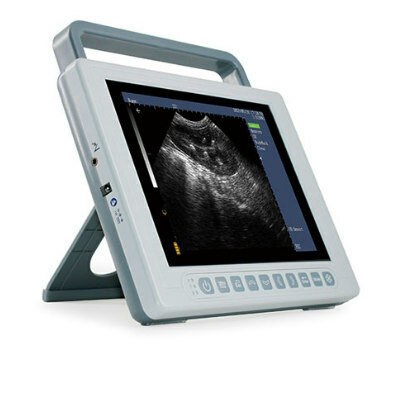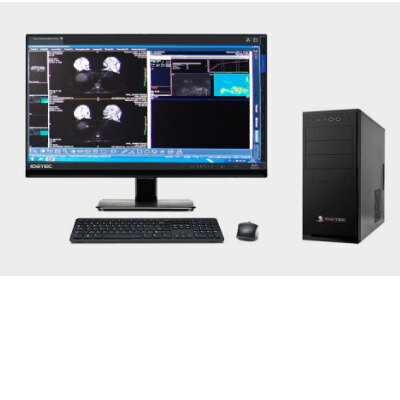Immersive Entertainment System Eases MRI Scan Anxieties
|
By MedImaging International staff writers Posted on 16 Dec 2020 |

Image: The CinemaVision MRI-compatible noise cancelling headphones and video visor (Photo courtesy of Resonance Technology)
A novel entertainment platform helps alleviate the apprehension and claustrophobia associated with a magnetic resonance imaging (MRI) procedure by transporting patients to a breathtaking virtual world.
The Resonance Technology (Northridge, CA, USA) CinemaVision is a video screening system that is composed of a headset that delivers symphonic-quality audio sounds and a video eye-visor with twin widescreen displays that help eliminate the fear of claustrophobia during the dark and noisy MRI or functional MRI scan procedure. Users can play a Blu-Ray or DVD movie, stream digital movies from a USB flash drive, connect to wireless Bluetooth device, or use a convenient AUX connection to hook up external audio/video media to the system controller.
The images produced are equivalent to a 62-inch screen viewed from a distance of less than two meters away. Features include a widescreen (16:9) or standard television (4:3) aspect ratio; a total resolution of 240,000 pixels for each of the displays; a 45 degrees horizontal field-of-view; a digital stereo headset with 30 dB noise-attenuating 40Hz-40 kHz range frequency response; a proprietary cordless laser link that transmits the audio-video signal from the console to the magnet room; and compatibility with 3T-rated field strength magnets.
“This device represents more than thirty years of development and state-of-the-art engineering,” said Mokhtar Ziarati, President and CEO of Resonance Technology. “We are confident this product will give you the tools you need for comforting the patient while undergoing MRI or fMRI scan procedures. To maintain being the leader in fMRI and MRI patient comfort systems in the MRI field, we strive to deliver what the customer needs along with impeccable customer service.”
Related Links:
Resonance Technology
The Resonance Technology (Northridge, CA, USA) CinemaVision is a video screening system that is composed of a headset that delivers symphonic-quality audio sounds and a video eye-visor with twin widescreen displays that help eliminate the fear of claustrophobia during the dark and noisy MRI or functional MRI scan procedure. Users can play a Blu-Ray or DVD movie, stream digital movies from a USB flash drive, connect to wireless Bluetooth device, or use a convenient AUX connection to hook up external audio/video media to the system controller.
The images produced are equivalent to a 62-inch screen viewed from a distance of less than two meters away. Features include a widescreen (16:9) or standard television (4:3) aspect ratio; a total resolution of 240,000 pixels for each of the displays; a 45 degrees horizontal field-of-view; a digital stereo headset with 30 dB noise-attenuating 40Hz-40 kHz range frequency response; a proprietary cordless laser link that transmits the audio-video signal from the console to the magnet room; and compatibility with 3T-rated field strength magnets.
“This device represents more than thirty years of development and state-of-the-art engineering,” said Mokhtar Ziarati, President and CEO of Resonance Technology. “We are confident this product will give you the tools you need for comforting the patient while undergoing MRI or fMRI scan procedures. To maintain being the leader in fMRI and MRI patient comfort systems in the MRI field, we strive to deliver what the customer needs along with impeccable customer service.”
Related Links:
Resonance Technology
Latest MRI News
- PET/MRI Improves Diagnostic Accuracy for Prostate Cancer Patients
- Next Generation MR-Guided Focused Ultrasound Ushers In Future of Incisionless Neurosurgery
- Two-Part MRI Scan Detects Prostate Cancer More Quickly without Compromising Diagnostic Quality
- World’s Most Powerful MRI Machine Images Living Brain with Unrivaled Clarity
- New Whole-Body Imaging Technology Makes It Possible to View Inflammation on MRI Scan
- Combining Prostate MRI with Blood Test Can Avoid Unnecessary Prostate Biopsies
- New Treatment Combines MRI and Ultrasound to Control Prostate Cancer without Serious Side Effects
- MRI Improves Diagnosis and Treatment of Prostate Cancer
- Combined PET-MRI Scan Improves Treatment for Early Breast Cancer Patients
- 4D MRI Could Improve Clinical Assessment of Heart Blood Flow Abnormalities
- MRI-Guided Focused Ultrasound Therapy Shows Promise in Treating Prostate Cancer
- AI-Based MRI Tool Outperforms Current Brain Tumor Diagnosis Methods
- DW-MRI Lights up Small Ovarian Lesions like Light Bulbs
- Abbreviated Breast MRI Effective for High-Risk Screening without Compromising Diagnostic Accuracy
- New MRI Method Detects Alzheimer’s Earlier in People without Clinical Signs
- MRI Monitoring Reduces Mortality in Women at High Risk of BRCA1 Breast Cancer
Channels
Radiography
view channel
Novel Breast Imaging System Proves As Effective As Mammography
Breast cancer remains the most frequently diagnosed cancer among women. It is projected that one in eight women will be diagnosed with breast cancer during her lifetime, and one in 42 women who turn 50... Read more
AI Assistance Improves Breast-Cancer Screening by Reducing False Positives
Radiologists typically detect one case of cancer for every 200 mammograms reviewed. However, these evaluations often result in false positives, leading to unnecessary patient recalls for additional testing,... Read moreUltrasound
view channel
Deep Learning Advances Super-Resolution Ultrasound Imaging
Ultrasound localization microscopy (ULM) is an advanced imaging technique that offers high-resolution visualization of microvascular structures. It employs microbubbles, FDA-approved contrast agents, injected... Read more
Novel Ultrasound-Launched Targeted Nanoparticle Eliminates Biofilm and Bacterial Infection
Biofilms, formed by bacteria aggregating into dense communities for protection against harsh environmental conditions, are a significant contributor to various infectious diseases. Biofilms frequently... Read moreNuclear Medicine
view channel
New SPECT/CT Technique Could Change Imaging Practices and Increase Patient Access
The development of lead-212 (212Pb)-PSMA–based targeted alpha therapy (TAT) is garnering significant interest in treating patients with metastatic castration-resistant prostate cancer. The imaging of 212Pb,... Read moreNew Radiotheranostic System Detects and Treats Ovarian Cancer Noninvasively
Ovarian cancer is the most lethal gynecological cancer, with less than a 30% five-year survival rate for those diagnosed in late stages. Despite surgery and platinum-based chemotherapy being the standard... Read more
AI System Automatically and Reliably Detects Cardiac Amyloidosis Using Scintigraphy Imaging
Cardiac amyloidosis, a condition characterized by the buildup of abnormal protein deposits (amyloids) in the heart muscle, severely affects heart function and can lead to heart failure or death without... Read moreGeneral/Advanced Imaging
view channel
New AI Method Captures Uncertainty in Medical Images
In the field of biomedicine, segmentation is the process of annotating pixels from an important structure in medical images, such as organs or cells. Artificial Intelligence (AI) models are utilized to... Read more.jpg)
CT Coronary Angiography Reduces Need for Invasive Tests to Diagnose Coronary Artery Disease
Coronary artery disease (CAD), one of the leading causes of death worldwide, involves the narrowing of coronary arteries due to atherosclerosis, resulting in insufficient blood flow to the heart muscle.... Read more
Novel Blood Test Could Reduce Need for PET Imaging of Patients with Alzheimer’s
Alzheimer's disease (AD), a condition marked by cognitive decline and the presence of beta-amyloid (Aβ) plaques and neurofibrillary tangles in the brain, poses diagnostic challenges. Amyloid positron emission... Read more.jpg)
CT-Based Deep Learning Algorithm Accurately Differentiates Benign From Malignant Vertebral Fractures
The rise in the aging population is expected to result in a corresponding increase in the prevalence of vertebral fractures which can cause back pain or neurologic compromise, leading to impaired function... Read moreImaging IT
view channel
New Google Cloud Medical Imaging Suite Makes Imaging Healthcare Data More Accessible
Medical imaging is a critical tool used to diagnose patients, and there are billions of medical images scanned globally each year. Imaging data accounts for about 90% of all healthcare data1 and, until... Read more
Global AI in Medical Diagnostics Market to Be Driven by Demand for Image Recognition in Radiology
The global artificial intelligence (AI) in medical diagnostics market is expanding with early disease detection being one of its key applications and image recognition becoming a compelling consumer proposition... Read moreIndustry News
view channel
Bayer and Google Partner on New AI Product for Radiologists
Medical imaging data comprises around 90% of all healthcare data, and it is a highly complex and rich clinical data modality and serves as a vital tool for diagnosing patients. Each year, billions of medical... Read more




















